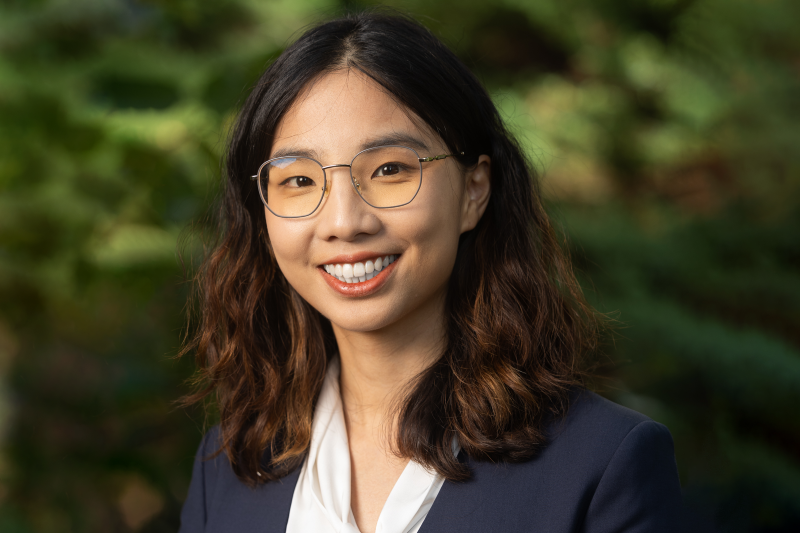-

Hear from Professor Monica Toft
Learn how Professor Monica Toft is shaping the study of global affairs and diplomacy at Fletcher.
Hear from Prof. Toft -

Explore Fletcher academics in action
Fletcher Features offers insights, innovation, stories and expertise by scholars.
Get global insights -
Get application tips right from the source
Learn tips, tricks, and behind-the-scenes insights on applying to Fletcher from our admissions counselors.
Hear from Admissions -

Research that the world is talking about
Stay up to date on the latest research, innovation, and thought leadership from our newsroom.
Stay informed -
Meet Fletcherites and their stories
Get to know our vibrant community through news stories highlighting faculty, students, and alumni.
Meet Fletcherites -

Forge your future after Fletcher
Watch to see how Fletcher prepares global thinkers for success across industries.
See the impact -

Global insights and expertise, on demand.
Need a global affairs expert for a timely and insightful take? Fletcher faculty are available for media inquiries.
Get in Touch
The Development Economist’s Toolkit
Sally Zhang uses development economics to assess unexpected behaviors

As assistant professor of economics at The Fletcher School, Sally Zhang is excited to bring her work and energy to a school with a global outlook.
Zhang grew up in Shanghai, China during a period of economic transformation. Watching the city grow and evolve around her first seeded her interest in development economics.
“There was a saying that you would rather have a bed in the west of Shanghai than a house in the east of Shanghai,” said Zhang. “Now the city’s central business district is in East Shanghai.”
“That rapid shift opened my eyes to how people's lives could change dramatically and set me on this path of studying development economics,” she added.
PhD in Practice
Zhang left China to pursue her undergraduate and doctoral studies in California. In her research, she seeks to understand the impediments people face to building better lives.
“That, in my opinion, is the first step to understanding how policies can shape society,” she said. “We want to first know what is preventing people from living better lives.”
Her PhD provided her with a launching pad to dive into development economics research. In her fieldwork, Zhang looked at couples in Sub-Saharan Africa, seeking to understand the reasons they might keep portions of their income to themselves.
“From a theoretical perspective, it didn’t seem like it would be the most optimal,” she said, citing how this could prevent couples from coordinating their finances strategically and making larger investments.
“At the same time, seeing how commonplace the practice is, I understood that people probably have a good reason to do it,” she said.
To learn more, Zhang traveled to Kenya, where she conducted her own fieldwork and began to untangle the complexity of the question, seeing the interplay of individual preferences and social norms at work.
As Zhang reflected upon her findings, she identified new dimensions to the question worth exploring. If both spouses know they hide income and believe that the other does as well, why don’t they renegotiate and find things that would satisfy both of them? Questions like these ignited Zhang’s love of development economics. She sees that many social norms are not deeply studied, and she values the opportunity to understand others’ experiences and behavior through her work. Development economics provides her with a potent, academic framework to understand unexpected human behaviors.
An Invaluable Economic Toolkit
Zhang has long appreciated studying development economics around the world. While the contexts behind people’s decision making in Shanghai, Nairobi, and Medford may vary, she sees that economics can provide students and scholars with an invaluable toolkit to understanding social forces.
In her course, Econometric Impact Evaluation for Development, she looks forward to helping students develop these skills. Students will study econometric techniques and learn how to apply them to impact evaluation, understanding the causal effects of various programs.
“For example, what is the effect of cash transfers?” she said. “How does someone fare differently if they do or don’t receive a cash transfer? These are the questions we're able to answer – with limitations – with these tools. My class teaches students a variety of statistical techniques that allows them to calculate ‘what would have happened.'"
“Econometrics or economic methods are tools for students to understand these societal issues that they're interested in,” she added. “Fletcher is a place where they are able to learn how to use different tools and decide which they would like to use to design more effective programs and policies, and improve people's welfare in their future roles as policy makers and leaders.”
Read more about Fletcher’s MALD: International & Development Economics degree program.

